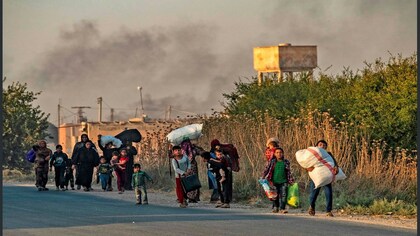Iran Creates False Hope for Renewed Relations With Egypt
13:25 - 27 June 2012

kurdpa: The election of Muslim Brotherhood candidate Mohamed Morsi as the new president of Egypt was welcomed by the semi-official FARS news agency in Iran.
FARS news, which is believed to be close to Iran’s Revolutionary Guard Corps, was optimistic that, based on what it says are Morsi’s previously stated foreign policy positions, he will be dedicated to “the resumption of Egypt’s diplomatic and strategic relations with all Islamic countries in the world including Iran.” FARS also quoted Morsi as having said that during Mubarak’s reign, Egypt’s relations were based on the interests of Israel and the United States and that he would reconsider all such relations.
Despite FARS’s optimism, Morsi on Sunday, in a nationwide address, reassured both Israel and the US that he would abide by Egypt’s previous treaty commitments, including its peace agreement with Israel.
In addition, not all of Morsi’s previous statements regarding Iran have been positive. In fact, on at least one occasion during the campaign, he publicly did his utmost to distance himself from Iran in an interview with the Kuwaiti publication Al-Kuwaite, parts of which were translated and published by the Iran-based publication ASR Iran news on June 21.
In the interview, Morsi was asked about the Muslim Brotherhood’s relations with Iran and the Lebanese Hezbollah movement.
“Delusional, slanderous and baseless” were the words he used to describe the charges that his organization has any direct relations with either Iran or Hezbollah. He went on to add “we support the Palestinian people’s right to resist against Israel’s occupation and do not see it as something bad…. but we will never stand with the forces who threaten friendly countries in the Arabian Gulf.”
In response to another question about the possible impact of Tehran and Cairo establishing formal relations on Egypt’s ties with Arab countries, Morsi went out of his way to emphasize his refusal to meet with Iran’s charge d’affaires in Egypt because of Iran’s stance towards Syria. He then went on to place special emphasis on the Sunni link, which bonds Egypt with most of the rest of the Arab world, especially with Saudi Arabia, while stating that “security and stability in the Arab world requires good relations between Egypt and Arab countries.” He added, “Our relations with regional Arab countries are eternal and strong.”
Morsi’s differing statements on Iran as reflected by FARS news and the ASR Iran article seem contradictory. After his victory Sunday, Iran’s leaders would be forgiven for asking “will the real Mohamed Morsi please stand up?”
In all likelihood, Morsi will try to distance himself from Iran as he promised the readers of Al-Kuwaite. This is due to several reasons, the economy being the most important.
With Iran and Saudi Arabia at loggerheads over Bahrain and Syria, any attempted rapprochement between Egypt and Iran would infuriate the Saudis and the rest of the Persian Gulf Cooperation Council. Their anger is unlikely to be limited to words. It is also likely to include withholding much needed economic aid and investment in Egypt. Despite Iranian President Mahmoud Ahmadinejad publicly promising to provide aid unconditionally and to work in one of Egypt\'s factories “to help the country get out of its current economic condition,” it’s very unlikely that the government of Iran — which is reeling under tough economic sanctions of its own — would be able to offer aid at the level that the Arab countries on the Persian Gulf can provide.
Given the fact that Egypt’s foreign exchange reserves are falling to new lows and demands for employment and higher wages are increasing, Morsi will not want to sacrifice aid and investment from oil-rich Arab countries for the sake of having better relations with Ayatollah Ali Khamenei\'s regime. Such a move would not only hurt Egypt economically, it would also hurt Morsi’s re-election chances in future voting, which is likely to take place fairly soon.
Religious differences are also likely to play a part. The Muslim Brotherhood is a Sunni organization backed by the vehemently anti-Shiite Sunni religious scholar Sheikh Yusuf Qardawi, who publicly backed Morsi for president. In 2008, Qardawi raised the anger of Shiites by referring to them as “heretics seeking to invade Sunni societies.” Any intended rapprochement by Morsi towards Tehran could create differences with some of his backers, who openly hold racist anti-Shiite views.
There is also the strategic rivalry between Iran and Egypt. The Muslim Brotherhood’s main religious credentials do not mean that after Morsi’\'s election, Egypt will be giving up its strategic interests in the region. This is especially true about Gaza. Egypt, under the secular Hosni Mubarak, wanted to be the main Arab power broker in Gaza. Egypt under the Muslim Brotherhood will want the same. This will mean that Cairo, under Morsi, will continue to undermine any influence which Iran may have left in Gaza after Hamas’ recent distancing from Iran because of Tehran’s support for the murderous regime of Syrian President Bashar al-Assad.
In a typical example of political bravado and wishful thinking, Ahmadinejad on June 15 stated that he is waiting for an official invitation to visit Cairo and that he’d go there immediately if invited. Judging by the Brotherhood’s greater need for support from Iran’s Persian Gulf rivals, as well as its closeness to vehemently anti-Shiite elements, it’s unlikely that Ahmadinejad will receive that invitation anytime soon.
By: Meir Javedanfar
Source – AL MONITOR
FARS news, which is believed to be close to Iran’s Revolutionary Guard Corps, was optimistic that, based on what it says are Morsi’s previously stated foreign policy positions, he will be dedicated to “the resumption of Egypt’s diplomatic and strategic relations with all Islamic countries in the world including Iran.” FARS also quoted Morsi as having said that during Mubarak’s reign, Egypt’s relations were based on the interests of Israel and the United States and that he would reconsider all such relations.
Despite FARS’s optimism, Morsi on Sunday, in a nationwide address, reassured both Israel and the US that he would abide by Egypt’s previous treaty commitments, including its peace agreement with Israel.
In addition, not all of Morsi’s previous statements regarding Iran have been positive. In fact, on at least one occasion during the campaign, he publicly did his utmost to distance himself from Iran in an interview with the Kuwaiti publication Al-Kuwaite, parts of which were translated and published by the Iran-based publication ASR Iran news on June 21.
In the interview, Morsi was asked about the Muslim Brotherhood’s relations with Iran and the Lebanese Hezbollah movement.
“Delusional, slanderous and baseless” were the words he used to describe the charges that his organization has any direct relations with either Iran or Hezbollah. He went on to add “we support the Palestinian people’s right to resist against Israel’s occupation and do not see it as something bad…. but we will never stand with the forces who threaten friendly countries in the Arabian Gulf.”
In response to another question about the possible impact of Tehran and Cairo establishing formal relations on Egypt’s ties with Arab countries, Morsi went out of his way to emphasize his refusal to meet with Iran’s charge d’affaires in Egypt because of Iran’s stance towards Syria. He then went on to place special emphasis on the Sunni link, which bonds Egypt with most of the rest of the Arab world, especially with Saudi Arabia, while stating that “security and stability in the Arab world requires good relations between Egypt and Arab countries.” He added, “Our relations with regional Arab countries are eternal and strong.”
Morsi’s differing statements on Iran as reflected by FARS news and the ASR Iran article seem contradictory. After his victory Sunday, Iran’s leaders would be forgiven for asking “will the real Mohamed Morsi please stand up?”
In all likelihood, Morsi will try to distance himself from Iran as he promised the readers of Al-Kuwaite. This is due to several reasons, the economy being the most important.
With Iran and Saudi Arabia at loggerheads over Bahrain and Syria, any attempted rapprochement between Egypt and Iran would infuriate the Saudis and the rest of the Persian Gulf Cooperation Council. Their anger is unlikely to be limited to words. It is also likely to include withholding much needed economic aid and investment in Egypt. Despite Iranian President Mahmoud Ahmadinejad publicly promising to provide aid unconditionally and to work in one of Egypt\'s factories “to help the country get out of its current economic condition,” it’s very unlikely that the government of Iran — which is reeling under tough economic sanctions of its own — would be able to offer aid at the level that the Arab countries on the Persian Gulf can provide.
Given the fact that Egypt’s foreign exchange reserves are falling to new lows and demands for employment and higher wages are increasing, Morsi will not want to sacrifice aid and investment from oil-rich Arab countries for the sake of having better relations with Ayatollah Ali Khamenei\'s regime. Such a move would not only hurt Egypt economically, it would also hurt Morsi’s re-election chances in future voting, which is likely to take place fairly soon.
Religious differences are also likely to play a part. The Muslim Brotherhood is a Sunni organization backed by the vehemently anti-Shiite Sunni religious scholar Sheikh Yusuf Qardawi, who publicly backed Morsi for president. In 2008, Qardawi raised the anger of Shiites by referring to them as “heretics seeking to invade Sunni societies.” Any intended rapprochement by Morsi towards Tehran could create differences with some of his backers, who openly hold racist anti-Shiite views.
There is also the strategic rivalry between Iran and Egypt. The Muslim Brotherhood’s main religious credentials do not mean that after Morsi’\'s election, Egypt will be giving up its strategic interests in the region. This is especially true about Gaza. Egypt, under the secular Hosni Mubarak, wanted to be the main Arab power broker in Gaza. Egypt under the Muslim Brotherhood will want the same. This will mean that Cairo, under Morsi, will continue to undermine any influence which Iran may have left in Gaza after Hamas’ recent distancing from Iran because of Tehran’s support for the murderous regime of Syrian President Bashar al-Assad.
In a typical example of political bravado and wishful thinking, Ahmadinejad on June 15 stated that he is waiting for an official invitation to visit Cairo and that he’d go there immediately if invited. Judging by the Brotherhood’s greater need for support from Iran’s Persian Gulf rivals, as well as its closeness to vehemently anti-Shiite elements, it’s unlikely that Ahmadinejad will receive that invitation anytime soon.
By: Meir Javedanfar
Source – AL MONITOR



